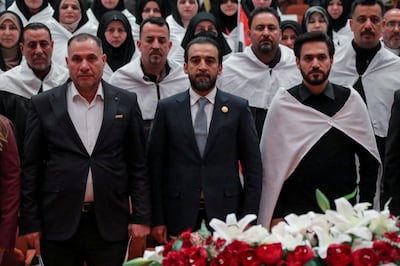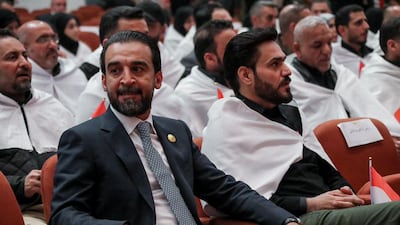Sunni politician Mohammed Al Halbousi, who has been re-elected as Speaker of Iraq's parliament, had always been the front-runner because of his strong performance and the country's system of government, experts have told The National.
Efforts to establish a new government officially began on Sunday.
During parliament’s heated session late on Sunday, Mr Al Halbousi, 41, won 200 votes from the 228 MPs present.
He had previously served as the governor of Anbar province, in the country’s west. When taking the post in 2018, he became the country's youngest politician to hold a prominent position.
“What was clear from the beginning was that out of the three presidencies — the speaker, president and prime minister — Mr Al Halbousi as speaker was most likely to keep his position because he had done well in the elections and his province of Anbar,” said Renad Mansour, director of the Iraq Initiative at London's Chatham House.
“It was less of a surprise for those making predictions,” Mr Mansour told The National.
On paper, Iraq’s governing system is outlined in the post-Saddam Hussein constitution, adopted in 2005. But informally, post 2003 has seen an agreement where the prime minister is a member of the Shiite majority, the speaker is a Sunni and the largely ceremonial role of president is held by a Kurd.
Politically, Mr Al Halbousi has “moved quickly through the ranks and has done well,” Mr Mansour said.

During the last few months, however, Iraqi politics has been dominated by the Muhasasa system in which “ethnic groups retreat and go in their own sides and decide on the three big positions,” he said.
“In this regard, Mr Al Halbousi was the clear front-line winner and the key was to unite the Sunni groups. It put him in the driving seat,” Mr Mansour said.
Mr Al Halbousi has been smart in building a strong Sunni base while accommodating the dominant Shiite parties, said Balsam Mustafa, a Leverhulme Early Career Fellow in the department of Politics and International Studies at the University of Warwick.
“Smart doesn't mean he is decent, competent or not corrupt,” Ms Mustafa added, however.
Mr Halbousi’s re-election is an “indictment of the post-2003 status-quo and perpetuates the Muhasasa system, which Tishreenies have sought to change,” she told The National, in reference to anti-government protesters.
The state’s system, known as the Muhasasa, ensures senior positions in government are divided among ethno-sectarian groups by quotas and often finalised in secretive back room deals.
Electoral results showed Mr Al Halbousi’s party, Taqadum, won 37 seats out of the 329 majority.
To the extent to which electoral mandates mean anything in Iraq, Mr Al Halbousi was unstoppable, Kirk Sowell, principal of the Utica Risk Services consulting firm said on Twitter.
“Of course, he could have been stopped, but given the custom of the speaker being Sunni, no other Sunni leader stands next to him given the election result,” Mr Sowell said.


